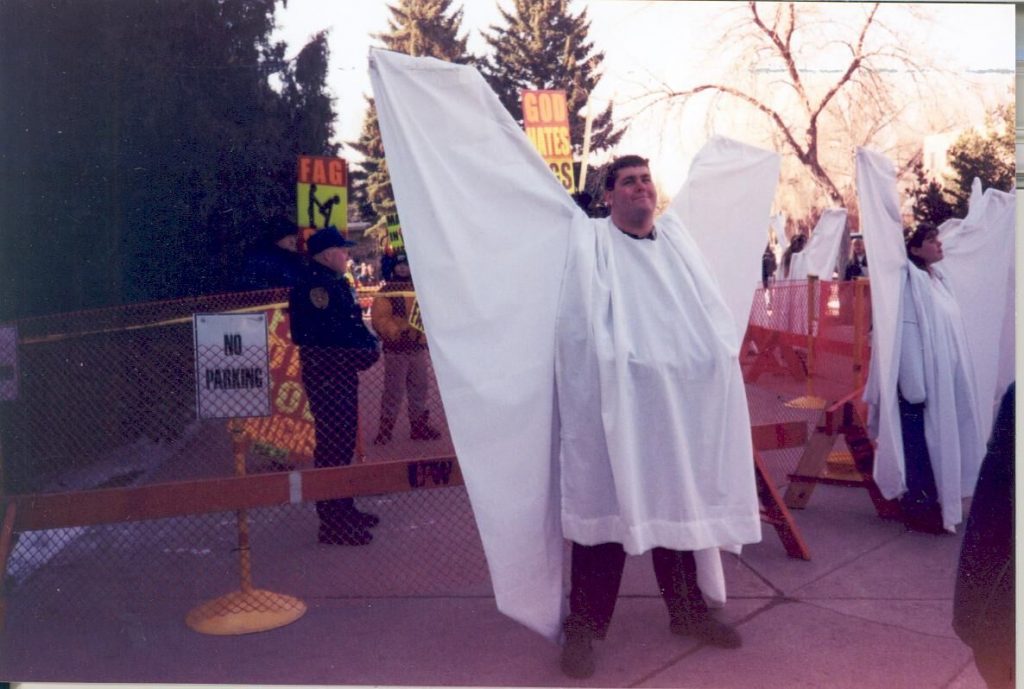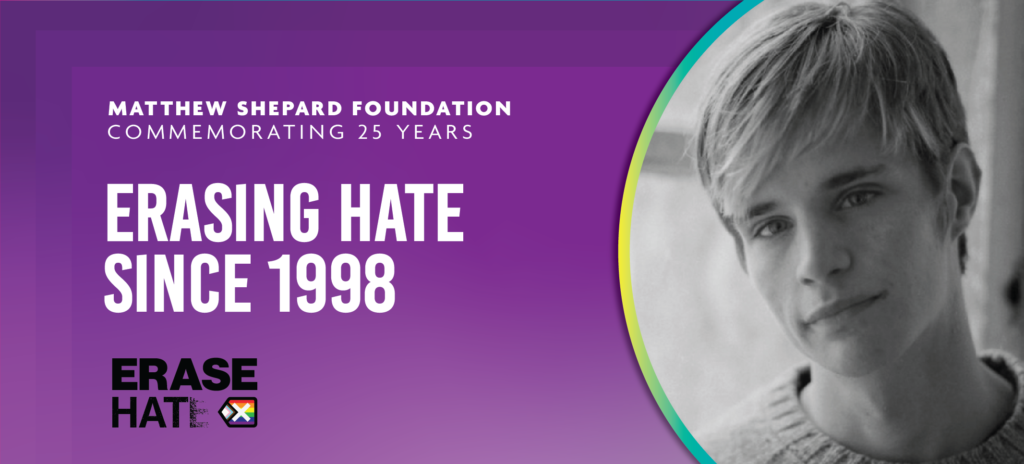What is the Foundation?
After their son was killed, Judy and Dennis Shepard set out to ensure people recognize the role that hate plays in society, and to ask people to do all they can to erase that hate. They founded the Matthew Shepard Foundation on that principle, and the Foundation continues to create open dialogues with a diverse range of people in order to erase hate.
What does the Foundation do?
Through local, regional and national outreach, we empower individuals to find their voice to create change and challenge communities to identify and address hate that lives within their schools, neighborhoods and homes.
The Matthew Shepard Foundation is dedicated to ending hate crimes by uniting its expertise and the power of Matt’s story to change hearts and minds.
Learn more about our efforts to Change Hearts and Minds and Eliminate Hate Crimes.
Aren’t there other groups out there that do the same work?
It’s true that there are several very effective LGBTQ+ groups advocating for various issues, but the Foundation has a unique perspective. Matt’s death was a watershed moment for our country and the world. It gave a face to hate crimes, especially anti-gay violence. Because our work is rooted in Matt’s story, powerfully told by his parents, we bring unparalleled authenticity and relevance to the impact of hate.
What are the Foundation’s greatest achievements?
Since our formation, the Foundation has helped pioneer the country’s first federal hate crimes legislation with the passing of the Matthew Shepard and James Byrd, Jr. Hate Crimes Prevention Act in 2009; provided hate crimes training to law enforcement officers and prosecutors since May 2017; created dialogue about hate and acceptance within communities around the world; and built a robust collection of resources to support The Laramie Project and other legacy works inspired by Matt’s story.
The same hate and violence that sparked the Foundation’s formation still exists today, both at home and abroad. We will continue to work tirelessly to ensure safety, visibility and inclusiveness for the entire LGBTQ+ community until that ideal becomes reality.
How did Matt’s death impact society?
Matt’s death was a major historical event, which outraged millions of people and provoked discussion about legislation, social attitudes, public safety and the struggle for LGBTQ+ people to enjoy full equality. For a variety of reasons, Matt became a personal symbol of the injustice of hate crimes and a rallying point for the LGBTQ+ rights movement. He was a very important example of the vulnerability of LGBTQ+ youth, which was highly motivational for parents, teachers and other adults to reflect upon in choosing how to treat similar young people in their own lives. Over the past two decades, we have learned that Matt’s story has the power to inspire others to join the fight, so we keep that hope alive by keeping Matt’s story alive.
What was the "Angel Action" movement?
During the 1999 trial against Matt’s killer, Aaron McKinney, the Westboro Baptist Church of Topeka, Kansas protested in front of the courthouse in Laramie, Wyoming while waving vulgar signs and shouting hate speech. Matt’s friends and supporters fashioned angel costumes with broad white wings and encircled the hate group, spreading their wings to make them impossible to see from the crowd where media cameras were located. This act is immortalized in the play (and later HBO production of) The Laramie Project, as well as in the song “Angel Action” in the oratorio Considering Matthew Shepard.

Where is the fence where Matt was found? Are there memorials to Matt?
The fence was taken down by the landowner not long after the murder, because so many people were trespassing on the land to come pay homage at the site.
While the fence has been removed, as Matt’s mother Judy says, for those who come out to pay their respects it’s not necessarily the fence itself but the sense of place that often is the most moving. For those wishing to pay respects, there is a memorial bench dedicated to Matt at the University of Wyoming. It is located on the east entranceway of the Arts & Sciences Building on campus in Laramie, WY.
How can I find out more about Matt and his life?
In the aftermath of Matt’s death and for years following it, the legacy of “Matthew Shepard” sparked curiosity into details of his life — who was Matt, and why did this happen to him? In her New York Times bestseller, The Meaning of Matthew: My Son’s Murder in Laramie, and a World Transformed, Judy Shepard explores the family’s journey, including Matt’s life, the prosecution of his murderers, the ensuing media coverage, and the family’s continuing work to advance civil rights.
Additionally, longtime friend and filmmaker Michele Josue created Matt Shepard is a Friend of Mine, a feature-length documentary about Matt that “revisits the shocking case with never-before-seen photos, rare video footage, and new revelations about Shepard’s all-too-brief life.”
Will Matt’s murderers ever be release from prison?
In short, no. In Wyoming, there is a distinction between life in prison and life without the possibility of parole or commutation. Russell Henderson pleaded guilty before his trial was to start in order to avoid the death penalty. He received two life sentences, for kidnapping and murder, to be served consecutively (one after the other) rather than concurrently (at the same time). This means he has virtually no chance for release. Aaron McKinney, who actually killed Matt, was convicted at trial and before the sentencing phase of the trial his defense team reached an agreement with the prosecution and the Shepard family to take the death penalty off the table. McKinney was sentenced to two consecutive life terms with no possibility of parole.

